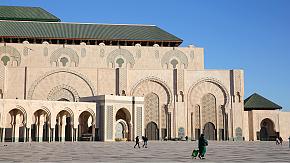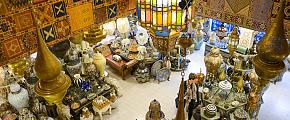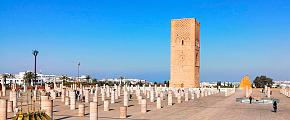How to Plan Your First Trip to Morocco
Morocco is a miracle created by God. With its unique climate and geographical location, it has created a fertile land known as the "Garden of North Africa" on the west side of the Sahara Desert, the largest desert in the world. After more than two thousand years of human carving, Morocco become a colorful gem waiting for you to appreciate it carefully. This article will introduce in detail everything you need to know before you go to Morocco!
When Is the Best Time to Morocco
The best time to go to Morocco is March to June and September to October when it is spring and autumn.As we already said, Morocco is in northwest Africa. To the north, it is on the Mediterranean Sea, to the west, it is on the Atlantic Ocean, and to the east, it is on the huge Atlas Mountains. It keeps the sandstorms and dry air of the Sahara Desert out and lets the warm, wet air from the ocean flow through it. Because of this, most of the northwest of Morocco has a nice Mediterranean temperature all year. Still, if this is your first time in the Sahara Desert, you should avoid the hot and dry summer months. Between October and March, it will rain a lot, which could mess up your plans to move outside.
How Many Days in Morocco Is Enough
Around 10 days would be an ideal duration to visit, allowing you to fully taste the essence of Morocco, such as Casablanca, Rabat, Fez, Marrakech, the Sahara Desert, etc. You can consider the main cities that interest you and reserve 1-2 days for each city. The more places you are interested in, the more time you need to visit. 14 days can guarantee you a leisurely and in-depth exploration of Morocco.Visa to Morocco
Travelers from over 70 countries can travel to Morocco for less than 90 days without a visa, including the US, Canada, Australia, New Zealand, European Union countries, the United Kingdom, China, and more. If you are looking forward to Morocco, bring your passport and start packing now!Language
The language environment in Morocco is quite complex. English is not widely used. The main official language used is Morocco Arabic, which is different from other traditional Arabic languages, but Moroccans can understand most of them. For historical reasons, a considerable number of Moroccans also speak French.How to Dress in Morocco
When dressing in Morocco, there are mainly two factors to consider: climate and religious culture. To defend against the heat, you'd better wear breathable clothes to avoid being bothered by sweat.Respecting other cultures can earn you corresponding respect as a tourist. Morocco is a Muslim country where women generally dress relatively conservatively. However, you can almost always find people dressed casually in big cities, so you don't have to worry too much. It's best to wear pants and skirts longer than your knees, and shirts that cover your shoulder. It's worth noting that both men and women need to take off their shoes when entering the mosque. Therefore, you can bring a bag to store your shoes.
Where to Go & Things to Do in Morocco
Morocco has a lot to explore, and we've curated a few must-sees and tried to keep its highlights brief. You can find more stunning places to visit in Morocco on our website, or contact our travel experts directly to introduce them to you!Marrakech
Marrakech means "divine domain" in Berber. It is the ancient capital of Morocco and is now the third-largest city in Morocco. Nestled at the foothills of the Atlas Mountains, Marrakech enchants visitors with its vibrant energy and rich history.Lost in the maze-like alleys of the medina, bustling markets offer a variety of fragrances, textiles, and handicrafts. The heart of the city, Djemaa el-Fna Square, comes alive at sunset with snake charmers, storytellers, and food stalls. Don't miss the architectural marvels like the towering Koutoubia Mosque and the intricately designed Bahia Palace, each offering a glimpse into the city's storied past.
 Koutoubia Mosque
Koutoubia Mosque
Chefchaouen
Tucked away in the Rif Mountains, Chefchaouen, or the "Blue City", captivates with its serene ambiance and striking blue-hued buildings. Stroll through the winding cobblestone streets of the medina, adorned with colorful pots of flowers and traditional Moroccan doorways.Take in panoramic views of the town from Plaza Uta el-Hammam, where quaint caFez and artisan shops beckon travelers to relax and unwind. For outdoor enthusiasts, nearby hiking trails offer breathtaking vistas of the surrounding landscapes.
Casablanca
Casablanca, Morocco's cosmopolitan coastal city, blends modernity with history along its bustling streets and vibrant neighborhoods. Admire the grandeur of the Hassan II Mosque, perched dramatically on the Atlantic coastline, with its intricate architecture and towering minaret. Wander along the Corniche, a lively promenade lined with palm trees, caFez, and sweeping ocean views. Dive into the city's diverse cultural heritage at landmarks like the Casablanca Cathedral and the bustling Central Market, where the sights, sounds, and flavors of Morocco come to life.Fez
Stepping into Fez is like entering a medieval labyrinth, where ancient traditions and craftsmanship thrive amidst narrow alleys and historic landmarks. Explore the UNESCO-listed Fez el-Bali, the largest medina in the world, where centuries-old souks brim with spices, textiles, and artisanal goods. Admire the exquisite tilework and architecture of the Al-Attarine Madrasa and the Bou Inania Madrasa, testaments to the city's rich cultural heritage. Experience the sensory overload of the tanneries and souks, where skilled artisans continue age-old traditions of leatherwork and craftsmanship.Merzouga Town
In the heart of the Sahara Desert, Merzouga Town serves as a gateway to unforgettable desert adventures and immersive cultural experiences. Embark on a camel trek into the vast expanse of Erg Chebbi, where towering sand dunes and endless skies create a surreal landscape. Spend the night under the stars in a traditional Berber camp, savoring local cuisine and listening to traditional music around a crackling bonfire. Delve into Berber culture with visits to nearby villages, where warm hospitality and ancient traditions await amidst the shifting sands of the desert. Sahara Camel Ride
Sahara Camel Ride
How to Get to Morocco
Morocco is easily accessible by air, with major international airports in cities like Casablanca, Marrakech, and Fez. Direct flights are available from many European and North American cities. Additionally, Morocco is well-connected by ferry services from Spain, with ports in Tangier and Ceuta.Get Around Morocco
In Morocco, travelers have various options for getting around, including trains, buses, and taxis. The national railway network connects major cities, offering comfortable and affordable transportation. Intercity buses are also widely available and cover routes across the country. For shorter distances or exploring within cities, taxis and ride-sharing services are convenient options.Money Conversion in Morocco
The currency used in Morocco is the Moroccan Dirham (MAD). Currency exchange services are available at banks, exchange offices, and airports. It's advisable to carry cash in smaller denominations, as larger bills may not always be accepted, especially in smaller establishments. Credit and debit cards are accepted in many hotels, restaurants, and shops, but it's wise to have cash on hand for smaller purchases and in more rural areas.Where to Stay in Morocco: Riads
For an authentic Moroccan experience, consider staying in a riad, a traditional Moroccan house or palace with an interior courtyard or garden. Riads are often beautifully decorated with intricate tilework, carved plaster, and ornate furnishings, offering a peaceful retreat from the bustling streets outside. Many riads have been converted into boutique hotels or guesthouses, providing intimate accommodations and personalized service. From the vibrant streets of Marrakech to the coastal charm of Essaouira, riads can be found in various cities across Morocco.What to Eat in Morocco
Moroccan cuisine is known for its bold flavors, aromatic spices, and diverse influences from Arab, Berber, and Mediterranean cuisines. Traditional Moroccan dishes include tagine (slow-cooked stews), couscous, pastilla (a savory pie), and grilled meats. Don't miss trying Moroccan mint tea, a refreshing and ubiquitous beverage enjoyed throughout the country. Street food vendors offer an array of snacks like grilled meats, pastries, and fresh juices, providing a taste of Morocco's vibrant culinary scene. Morocco Food
Morocco Food
Explore Morocco With Odynovo
With such wonderful and diverse destinations, how can we let it pass by? If you want to have a great first encounter with Morocco, you deserve our best company! Exclusive travel guidance to make your vacation worry-free!Quick Question
What Our Clients Say
"Great Service and Value", "Exceed All Expectations", "Highly Recommend".SUBSCRIBE TO WIN A FREE TOUR
Subscribe to our newsletter for a chance to win a free 7-day tour to Egypt! And more insider travel news, exclusive offers, and inspiration will be sent straight to your inbox. Check our previous newsletters and get some sparks.










